Related Research Articles

Kathleen Mansfield Murry was a New Zealand writer, essayist and journalist, widely considered one of the most influential and important authors of the modernist movement. Her works are celebrated across the world, and have been published in 25 languages.

3-South is an American adult animated series that aired on MTV from November 7, 2002 to January 16, 2003. The show focused on two lifelong friends, Sanford and Del, and their adventures at the fictional Barder College. With the exception of their roommate Joe, nearly everyone at Barder is stupid and inept. Nonetheless, the idiotic, irresponsible, and thoughtless Sanford and Del are portrayed as the series' heroes, whereas the responsible, intelligent Joe is the de facto villain in most episodes.
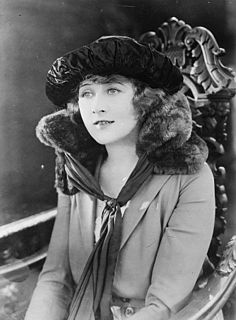
Anna Quirentia Nilsson was a Swedish-American actress who achieved success in American silent movies.

Lynn Hamilton is an American former actress whose acting debut came in 1959 in John Cassavetes' Shadows, She is best known for her recurring role as Donna Harris; Fred's girlfriend and later fiancée on the sitcom Sanford and Son.

Lois Wilson was an American actress who worked during the silent film era. She also directed two short films and was a scenario writer.

DeWitt Clinton High School is a public high school located since 1929 in the Bronx, New York, United States. Opened in 1897 in Lower Manhattan as an all-boys school, it maintained that status for nearly 100 years. In 1983 it became co-ed. From its original building on West 13th Street in Manhattan, it moved in 1906 to its second home, located at 59th Street and Tenth Avenue. In 1929 the school moved to its present home on Mosholu Parkway in the Bronx.
Baseball Joe is the fictional hero of a number of children's books written by Howard R. Garis under the name of "Lester Chadwick". The series follows the main character, a star baseball player named Joe Matson, from high school to college and then to success as a professional.
The Alice series is a young adult book series written by Phyllis Reynolds Naylor, consisting of 25 books and three prequels, and it has been frequently challenged, as documented in the American Library Association's lists of the 100 most frequently challenged books from 1990-2019. The main character is Alice McKinley, and the Alice series covers her development through adolescence and puberty to the final book, Now I’ll Tell You Everything, where Alice turns 60 years old. Through intimate relationships, jobs, disastrous accidents, and accidental parental meetings, the journey from a child into a grown-women is narrated in the Alice series. Important and notable characters are Alice’s three best friends, Pamela, Gwen, Elizabeth; her first love, Patrick; her aunt, Sally; her brother, Lester; and her father. Dating, sex, friendship, familial matters, religion, and homosexuality are some of the controversial themes that Phyllis Reynolds Naylor uses to narrate the life story of Alice McKinley.
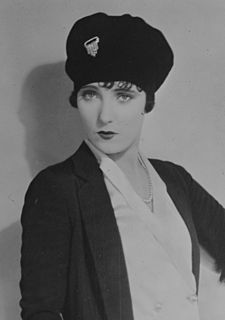
Pauline Starke was an American silent-film actress.

Doris Margaret Kenyon was an American actress of motion pictures and television.

Kate Lester was an American theatrical and silent film actress. Her family, the Suydams of New York, were staying in Britain at the time of her birth.
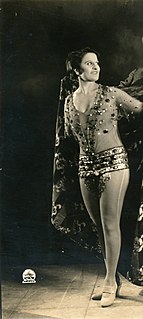
Carmen Phillips was an American actress of the silent era. She appeared in more than 60 films between 1914 and 1926, frequently as a "vamp".

Jessie Graham Flower is a pseudonym for American author Josephine Chase. Born about 1878 in Pennsylvania to Edward H. Chase and Mary Arrner Chase. Chase was the author of the popular Grace Harlowe series of 27 books for girls, written between 1910 and 1924. The books fall into four separate series, including a high school series, college series, Overseas series, and Overland Riders series. Chase died February 8, 1931 in Philadelphia. She never married and was survived by her sister, Edna Chase.

Hubert Murray Burge was an Anglican clergyman, headmaster of Winchester College, Bishop of Southwark, and Bishop of Oxford.
Grace Harlowe is the protagonist and eponym of four series of books for girls, published by Altemus between 1910 and 1924. At least some volumes were reprinted by Saalfield Publishing. The High School Girls Series, College Girls Series, Grace Harlowe Overseas Series, and Grace Harlowe Overland Riders Series were written by Josephine Chase, under the pseudonym Jessie Graham Flower.
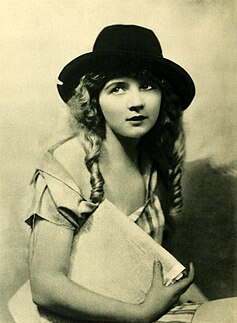
Gladys Leslie Moore was an American actress in silent film, active in the 1910s and 1920s. Though less-remembered than superstars like Mary Pickford, she had a number of starring roles from 1917 to the early 1920s and was one of the young female stars of her day.
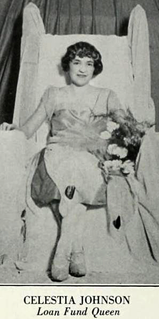
Celestia Marguerita Johnson Taylor was a professor of English at Brigham Young University (BYU) and a member of the Relief Society general board. She wrote a column on homemaking for Relief Society Magazine (1966–70). She was an avid singer and sang in many musical performances at BYU.
Emma Speed Sampson, was an American author of juvenile fiction and a movie censor.
Alice Turner Curtis was an American writer of juvenile historical fiction. She was probably best remembered by young readers of her day for The Little Maid's Historical Series. She has written at least sixty published books.
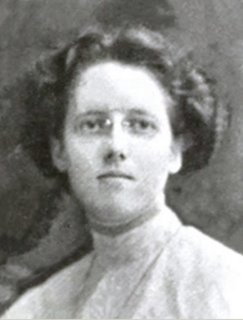
Marjorie O'Connell Shearon was a palaeontologist from Newark, New Jersey. She earned a master's degree and a PhD from Columbia University. She wrote numerous scientific articles and named various species of ammonite fossils as Marjorie O'Connell, her maiden name before she married William Shearon in 1927.
References
- ↑ Lundin, Anne H.; Wayne Weigand, eds. (2003). Defining print culture for youth: the cultural work of children's literature . Libraries Unlimited. pp. 114–115. ISBN 978-0-313-32177-1.
grace harlowe series girls.
- 1 2 Carpon, Carolyn (December 28, 2008). Sisters, Schoolgirls, and Sleuths: Girls' Series Books in America. The Scarecrow Press, Inc. p. 23. ISBN 978-0-8108-5756-8.